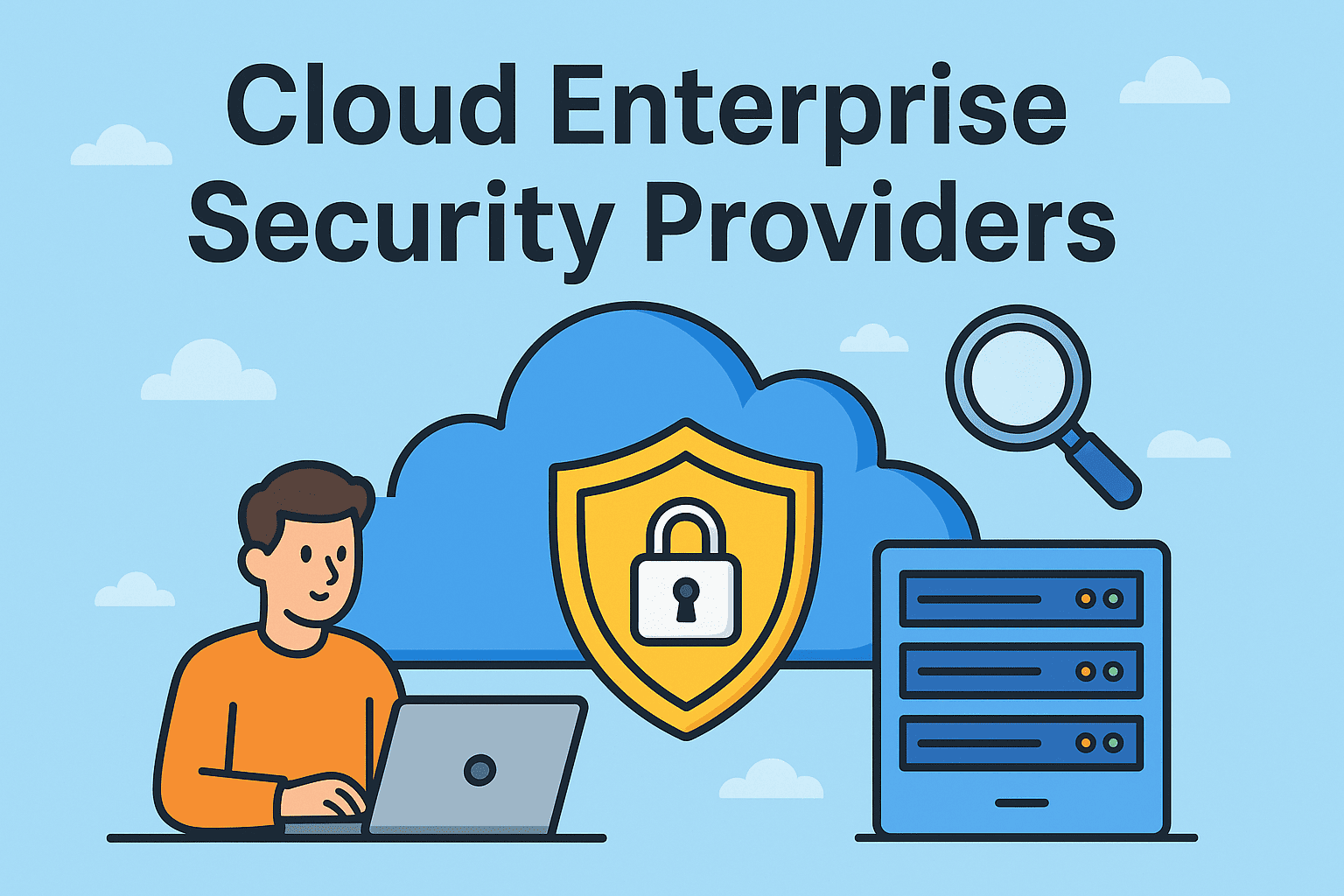Updated on October 13, 2025, by OpenEDR
What Are Cloud Enterprise Security Providers?
Cloud enterprise security providers are companies that specialize in protecting organizations’ cloud environments, applications, and data. They offer comprehensive solutions that combine technology, policies, and monitoring to reduce risk and ensure compliance.
Key Services Offered:
Identity and Access Management (IAM) – Control who can access cloud resources.
Data Encryption – Protect sensitive data at rest and in transit.
Threat Detection & Response – Monitor, identify, and mitigate attacks.
Compliance Tools – Support for GDPR, HIPAA, SOC 2, and other regulations.
Cloud Security Posture Management (CSPM) – Continuous monitoring to prevent misconfigurations.
👉 In short, cloud enterprise security providers act as partners in securing cloud-first organizations.
Why Businesses Need Cloud Enterprise Security Providers
Cloud adoption provides scalability and flexibility, but it also brings new risks. Cybercriminals are targeting cloud infrastructure at alarming rates, and misconfigurations remain the leading cause of breaches.
Benefits of Working with Cloud Security Providers:
Comprehensive Protection – Multi-layered defense against evolving threats.
Regulatory Compliance – Stay aligned with complex legal requirements.
Cost Efficiency – Outsourcing to providers reduces in-house security costs.
Expertise on Demand – Access to specialized cybersecurity professionals.
Business Continuity – Reduce downtime with backup and recovery solutions.
👉 Without the support of cloud enterprise security providers, many organizations leave themselves vulnerable to data breaches and compliance violations.
Common Cloud Security Threats
To appreciate the value of providers, it’s important to understand the risks they address:
Data Breaches – Exposing sensitive data stored in the cloud.
Insider Threats – Employees misusing privileged access.
Ransomware – Encrypting cloud data and demanding payment.
Account Hijacking – Stolen credentials used for unauthorized access.
API Exploits – Weak or insecure APIs targeted by attackers.
Compliance Failures – Non-adherence to regulations leading to fines.
Cloud enterprise security providers mitigate these risks through continuous monitoring, automation, and proactive defenses.
Types of Cloud Security Solutions Offered
Leading cloud enterprise security providers deliver a wide range of solutions.
1. Cloud Access Security Broker (CASB)
Provides visibility into cloud usage.
Enforces policies for compliance and data protection.
2. Security Information and Event Management (SIEM)
Real-time monitoring of logs and activity.
Alerts and responds to suspicious behavior.
3. Identity and Access Management (IAM)
Multi-factor authentication (MFA).
Role-based access control to minimize insider risks.
4. Data Loss Prevention (DLP)
Protects sensitive information from unauthorized sharing.
Enforces encryption and access restrictions.
5. Cloud Workload Protection Platforms (CWPP)
Protects workloads across private, public, and hybrid clouds.
Ensures consistent security policies.
Choosing the Right Cloud Enterprise Security Provider
Not all providers are created equal. When evaluating options, organizations should consider:
Scalability – Can the provider grow with your business?
Compliance Coverage – Do they support your industry’s regulations?
Integration Capabilities – Can their tools work with your current stack?
Automation & AI – Do they use advanced tech for faster detection?
Customer Support – Do they offer 24/7 assistance and managed services?
👉 Selecting the right provider is about finding a partner that aligns with both technical and business objectives.
Cloud Enterprise Security Providers vs. In-House Security
Some businesses wonder if in-house teams can handle cloud security. Here’s a comparison:
| Aspect | In-House Security Teams | Cloud Enterprise Security Providers |
|---|---|---|
| Expertise | Limited to internal resources | Specialized professionals |
| Cost | High (hiring + training staff) | Subscription or service-based |
| Scalability | Limited | Highly scalable solutions |
| Coverage | Focused on internal risks | Holistic cloud + cyber threat coverage |
| Compliance Support | Manual processes | Automated and industry-specific tools |
👉 Providers offer broader, faster, and more cost-efficient protection compared to in-house-only approaches.
Industries That Rely on Cloud Enterprise Security Providers
Different industries have unique cloud security needs, and providers tailor solutions accordingly:
Healthcare – HIPAA compliance, patient data protection.
Finance – Fraud detection, encryption, compliance with SOX & GDPR.
Retail – Secure e-commerce platforms and customer payment protection.
Government – Defense against cyber espionage and data leaks.
Tech & SaaS – API security and DevOps integration.
Future of Cloud Enterprise Security Providers
The role of providers will continue to expand as cloud adoption grows. Expect:
AI-Powered Security Analytics – Detect anomalies in real-time.
Quantum-Resistant Encryption – Preparing for next-gen threats.
Zero Trust Architectures – Enforcing “never trust, always verify” policies.
Integrated Multi-Cloud Solutions – Simplifying security across platforms like AWS, Azure, and Google Cloud.
Providers will evolve into strategic security partners, not just service vendors.
FAQs: Cloud Enterprise Security Providers
1. What do cloud enterprise security providers do?
They deliver tools and services to secure cloud environments, data, and applications against cyber threats.
2. Are providers necessary if I already have IT security staff?
Yes. Providers supplement internal teams with expertise, scalability, and advanced technologies.
3. How do providers help with compliance?
They offer automated compliance frameworks, reporting, and monitoring tailored to regulations.
4. Do small businesses need cloud security providers?
Absolutely. Small businesses are often the most targeted by cybercriminals.
5. Can cloud security providers stop all threats?
No solution guarantees 100% protection, but providers dramatically reduce risks and strengthen resilience.
Conclusion: Why Providers Are Essential
So, what are cloud enterprise security providers? They are the experts who safeguard your organization’s data, applications, and operations in increasingly complex cloud environments.
By partnering with the right provider, businesses gain not only protection against cyber threats but also compliance support, cost efficiency, and peace of mind.
👉 Secure your enterprise with next-generation cloud security. Register here to explore solutions tailored to your business.
